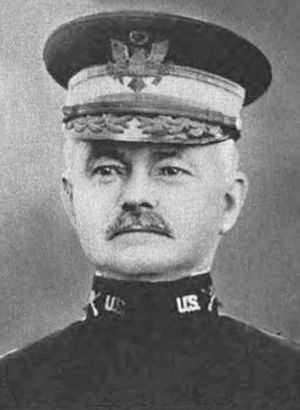William P. Burnham facts for kids
Quick facts for kids
William P. Burnham
|
|
|---|---|

Burnham as a Major General and commander of the 82nd Division in 1918
|
|
| Born | January 10, 1860 Scranton, Pennsylvania, US |
| Died | September 27, 1930 (aged 70) San Francisco, California, US |
| Place of burial | |
| Allegiance | United States |
| Service/ |
United States Army |
| Years of service | 1880–1924 |
| Rank | Major General |
| Commands held | United States Army Command and General Staff College Puerto Rican Regiment 56th Infantry Regiment 164th Infantry Brigade 82nd Division Fort McDowell Presidio |
| Battles/wars | Spanish–American War Philippine–American War World War I
|
| Awards | Croix de Guerre (France) Legion of Honor (Officer) (France) Companion of the Order of the Bath (United Kingdom) Medal of Military Merit (Greece) (First Class) |
William P. Burnham (born January 10, 1860 – died September 27, 1930) was an important United States Army officer. He became a Major General. He is best known for leading the 82nd Division during World War I.
Contents
Early Life and Army Start
William Power Burnham was born in Scranton, Pennsylvania, on January 10, 1860. His father, David Roe Burnham, was also an army officer. He fought in the American Civil War.
William went to Kansas State Agricultural College. Then, he studied at the United States Military Academy (West Point) from 1877 to 1880.
Burnham left West Point before finishing his studies. He joined the Army's 14th Infantry Regiment. He became a Sergeant. In 1883, he became a second lieutenant in the infantry.
He first served with the 6th Infantry Regiment. He was stationed at Fort Douglas and other places in the western United States until 1889.
In 1889, Burnham went to a special school at Fort Leavenworth. He did very well there. He even wrote one of the best essays, called Military Training of the Regular Army.
Later, he served with other infantry regiments. These included the 11th, 6th, and 20th. He was stationed at places like Fort Porter and Fort Leavenworth. He became a First Lieutenant in 1891. In 1898, he was promoted to Captain.
Serving in Wars
Spanish–American War
During the Spanish–American War, Burnham became a temporary Lieutenant Colonel. He worked as an Inspector General for the 4th Missouri Volunteer Infantry Regiment.
Philippine–American War
After that, Burnham worked in the Philippines during the Philippine–American War. He also served at Fort Sheridan, Illinois. Later, he was stationed at places like the Presidio and Fort Shafter.
From 1913 to 1914, he was in charge of the United States Army Command and General Staff College. In 1917, he commanded Camp Otis in the Panama Canal Zone.
World War I and the "All-American Division"
Some people say Burnham fired America's first shot in World War I. In March 1915, he was in Puerto Rico. A German supply ship, the Odenwald, was trying to leave without permission. Burnham warned the ship's captain. When the captain tried to leave, Burnham ordered a cannon fired across the ship's front. This made the ship return to port.
In July 1917, Burnham was given command of the 56th Infantry Regiment. In August, he became a brigadier general. He then commanded the 164th Infantry Brigade.
Starting in December 1917, Burnham also led the 82nd Division. He gave this division its famous nickname, the "All-American Division." He said it fit because the soldiers came from all 48 states. They were the best from everywhere in the country.
Burnham led the 82nd Division in battles in France. These included the St. Mihiel Offensive and the start of the Meuse-Argonne Offensive. In October 1918, he was replaced as commander.
After leaving the 82nd Division, Burnham became a U.S. military attaché in Athens, Greece. He served there until July 1919.
After the Wars
After World War I, Burnham returned to his permanent rank of colonel. From 1919 to 1922, he commanded a discharge and replacement center at Fort McDowell. In 1922, he was assigned to command the Presidio. He stayed there until he retired.
Writing Career
During his time in the military, Burnham wrote several articles. These were for professional journals. Some of his writings include:
- Military Training of the Regular Army (1889)
- Three Roads to a Commission (1893)
- Duties of Outposts, Advance and Rear Guards (1893)
- Historical Sketch, Twentieth United States Infantry (1902)
Retirement and Passing
Burnham retired from the Army in 1924. He was 64 years old. He lived in San Francisco after retiring. He passed away on September 27, 1930. He was buried at Arlington National Cemetery.
Awards and Honors
William P. Burnham received several awards for his service.
United States Awards
He earned these medals from the United States:
- The Spanish Campaign Medal
- The Army of Cuban Occupation Medal
- The Philippine Campaign Medal
- The World War I Victory Medal
Foreign Awards
He also received honors from other countries:
- The British Order of the Bath
- The Greek Medal of Military Merit (First Class)
- The French Croix de Guerre
- The French Legion of Honor (Officer)
Family Life
William P. Burnham was the son of Major David R. Burnham. His father was a career Army officer. He fought for the Union Army in the American Civil War.
In 1890, William married Grace Francesca Meacham. They had one son and two daughters. Their children were Edward Meacham Burnham, Frances Meacham Burnham, and Helen Meacham Burnham.
 | May Edward Chinn |
 | Rebecca Cole |
 | Alexa Canady |
 | Dorothy Lavinia Brown |

